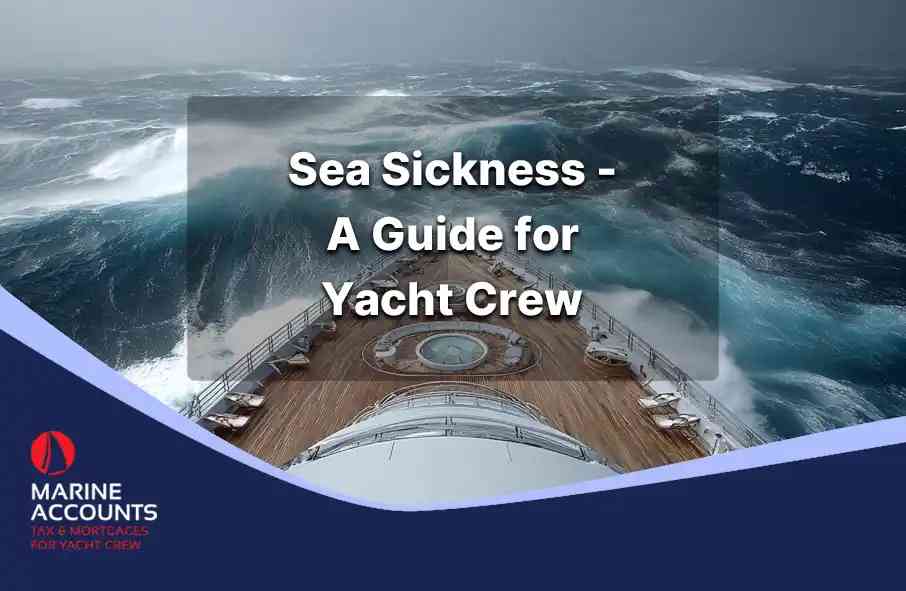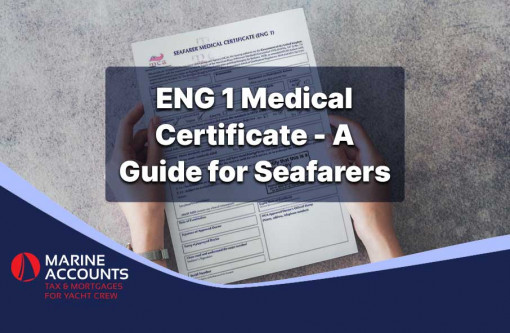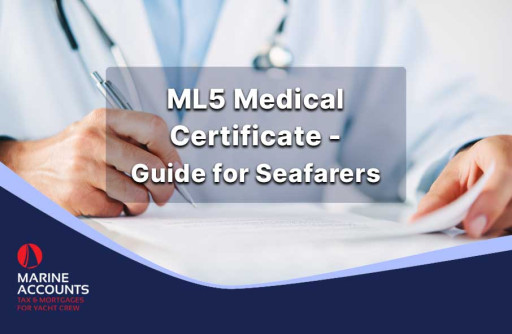Sea Sickness - A Guide for Yacht Crew
- Authors
-
-

- Name
- Patrick Maflin
-

Sea sickness is a form of motion sickness caused by conflicting signals between the inner ear (balance system) and the eyes, producing nausea, dizziness and other symptoms when the body perceives movement at sea.
Chapters
- What is Sea Sickness?
- What are the Symptoms of Sea Sickness?
- What Causes Sea Sickness?
- Do Yacht Crew Get Sea Sick?
- How to Treat Sea Sickness
- How to Prevent Sea Sickness
- When to See a Doctor
- Conclusion
What is Sea Sickness?
Sea sickness is the seafarer’s version of motion sickness, and it arises when the body struggles to process different messages about movement.
Your inner ear senses the yacht rolling beneath you, but if you are below deck and your eyes see only a still cabin, your brain receives mixed information.
This sensory conflict creates the unpleasant reaction we call sea sickness.
While it can make even the most experienced sailor miserable, sea sickness is not dangerous in itself.
For most people, the symptoms ease once the motion stops or after a period of adaptation at sea.
Understanding what it is, however, is the first step in learning how to deal with it.
What are the Symptoms of Sea Sickness?

Symptoms usually begin with a vague sense of unease.
A crew member may notice yawning, sweating or a loss of appetite.
This can quickly progress to nausea, dizziness and fatigue, and in severe cases, vomiting.
People often describe feeling pale, clammy and drained of energy.
The severity varies greatly from one person to another.
Some yacht crew only ever experience mild queasiness in heavy seas, while others can be incapacitated by the same conditions.
What Causes Sea Sickness?
The root cause lies in sensory conflict.
The inner ear detects the boat’s motion, but if the eyes are focused on something stationary such as a chart table, a bunk or even a phone screen, the brain receives contradictory information.
This mismatch is what triggers the feeling of nausea.
Other factors can make matters worse.
Tiredness, dehydration and anxiety are all known triggers, and certain types of movement like sharp rolling or unpredictable pitching, are especially troublesome.
Strong smells, such as fuel or galley odours, can also tip a queasy stomach into full-blown sickness.
Do Yacht Crew Get Sea Sick?
Yes, yacht crew can suffer from sea sickness just like passengers.
However, the difference lies in exposure and adaptation.
Those who spend their lives at sea usually become accustomed to the motion after a few days, a process known as habituation.
But even seasoned crew are not immune.
Returning from long periods ashore, working night watches or sailing in confused seas can all trigger symptoms again.
It is important for new crew members to realise that sea sickness is not a weakness.
It is a natural physiological reaction, and with time most people adapt.
On professional yachts, colleagues are usually understanding and supportive, knowing full well that everyone has been through it at some stage.
How to Treat Sea Sickness

When sea sickness strikes, the priority is to make the crew member more comfortable while their body adjusts.
Moving into fresh air and fixing the gaze on the horizon often provides relief.
Lying flat and keeping the head still can also reduce the conflicting signals reaching the brain.
Hydration is important, as nausea and vomiting quickly deplete fluid levels.
Small sips of water, or a rehydration drink, can help.
Some people find ginger tea or plain biscuits soothing, while heavy meals, alcohol and caffeine tend to aggravate symptoms.
Medication can also be effective.
Antihistamines such as cyclizine or promethazine are commonly used, although they may cause drowsiness, which is not ideal for crew on duty.
Scopolamine patches are another option, but they require medical approval and careful use due to possible side effects.
A yacht nurse or captain will usually advise on what is appropriate for crew.
How to Prevent Sea Sickness
Prevention is always better than cure, and there are several strategies yacht crew can adopt.
Choosing a cabin in a more stable part of the yacht, usually midships and lower down, helps during rest periods.
Spending time on deck and keeping sight of the horizon allows the brain to reconcile the movement more effectively.
Eating light, balanced meals and avoiding strong odours or heavy foods before departure also reduces the risk.
Crew who know they are prone to sea sickness sometimes begin preventative medication before a long passage.
Others prefer natural methods, such as acupressure wristbands or ginger supplements.
Most importantly, repeated exposure is the best long-term solution.
With time, the brain learns to reconcile the mixed signals, and crew often notice that each trip becomes easier to handle.
When to See a Doctor

Although sea sickness itself is rarely dangerous, there are times when medical attention is needed.
Persistent vomiting can cause dehydration, which is a serious risk during long passages.
If a crew member cannot keep fluids down, medical advice should be sought.
Similarly, symptoms that do not ease after several days at sea, or those that are unusually severe, may indicate another underlying condition.
Headaches, visual disturbances or chest pain should never be dismissed as simple sea sickness.
Yachts are equipped with telemedicine links and protocols for contacting shore-based doctors when necessary, and captains will arrange for medical evacuation if a crew member’s health is at risk.
Conclusion
Sea sickness is an unwelcome but common companion for many yacht crew.
Caused by conflicting messages between the eyes and inner ear, it can sap energy, reduce concentration and make life at sea miserable.
Yet it is usually short-lived, easing with time, treatment and preventative measures.
The key is to recognise that it is a natural response, not a flaw, and to manage it sensibly.
With fresh air, hydration, careful diet and, when necessary, medication, most crew find they can overcome the challenge and continue their duties.
For many, it becomes little more than a passing discomfort - one of the small realities of life at sea that soon fades into the background once the voyage settles in.
Disclaimer: Any advice in this publication is not intended or written by Marine Accounts to be used by a client or entity for the purpose of (i) avoiding penalties that may be imposed on any taxpayer or (ii) promoting, marketing or recommending to another party matters herein.






